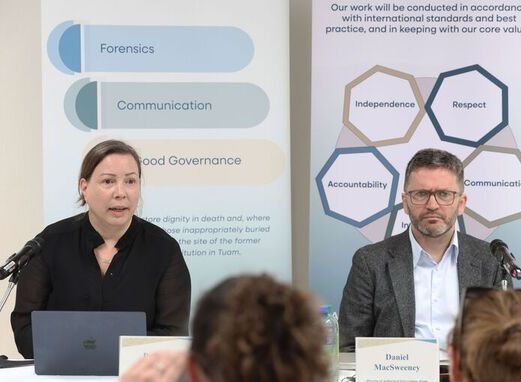Ben Barnes, Billy Roche, Barbara Jones, John Banville and Elizabeth White, executive director of the Wexford Arts Center.
PHOTO: ORLA O’SULLIVAN
By Orla O’Sullivan
Glimpses into the 10th annual 1st Irish in 2017 were had late last week as the theatre festival wound down in New York. Both “Wexfour – featuring Wexford county stars, from the arts, not sports – and “Wilde at Home” are likely to return, the festival organizers say.
One of the four one-act plays seen in “Wexfour,” Eoin Colfer’s powerful tale of a multiple sclerosis sufferer, has been developed into a full-length play that director Ben Barnes hopes to bring to Origin’s 1st Irish 2017.
Billy Roche, perhaps the county’s best-known playwright, was present at Lincoln Centre, along with Barnes, novelist John Banville, and Irish Consul General Barbara Jones, an Enniscorthy native, who moderated a discussion after the readings.
They included a dramatized excerpt from Banville’s Booker-shortlisted “The Book of Evidence,” a one-act by Roche, and another, which read like a short story, from the absent, Wexford-educated Colm Tóibín.
The actors, who had only a day and a half to prepare for this soft U.S. premiere, did great justice to the works, created for the 2014 celebration of the Wexford Arts Centre’s 40th anniversary. They included Geraldine Hughes and Colin Lane, who was also in the 1st Irish hit, “Crackskull Row.”
Billy Carter, recently seen opposite Matthew Broderick in “Shining City,” played the MS sufferer in Colfer’s play, “My Real Life.” The character, Noel, is recording a tape to leave behind once he commits suicide.
MS is not his main regret, Noel explains, in the tape addressed to a lifelong friend, whom he encourages to tell an untrue but heroic anecdote about him at “the afters.” That gives some sense of the humor Colfer finds in his dark subject matter.
Noel rationalizes his need: “You know what the people of Wexford are like. Even Mother Teresa would not get it easy. About town, it’d be all, ‘Oh would ye look at yer wan with her orphans.’”
Whatever Wexford’s idiosyncrasies, the county was celebrated in the discussion after the performances. “I left Wexford a long time ago,” Banville said, “I realized how much I missed it when I was back [for ‘Wexfour’].”
Wilde vignettes
“Wilde at Home” offers vignettes from Oscar Wilde’s work, performed by graduates of The American Academy of Dramatic Arts, as they move around its period home on Madison Avenue. A butler in character directs the audience up winding staircases and into libraries and theatres within the 1906 landmark building. (This makes it newer than the Academy, which, having been established in 1884, is said to be the oldest acting school in the English-speaking world.)
The butler is the one character who directly addresses the audience, so dismantling the fourth wall less than some other immersive-theatre experiences.
The actors enact sections from Wilde’s best-known works, the play, “The Importance of Being Earnest” and the novel “The Picture of Dorian Gray.” There are also several scenes from “Lady Windermere’s Fan” and one of the children’s stories he wrote for his children he would never more see after being imprisoned on charges of homosexuality.
Wilde’s lover, Lord Alfred Bruce Douglas, is introduced to the audience by his nickname Bosie, at the outset, as is Wilde’s wife Constance, though the two do not feature again in the 70-minute performance. Clearly, familiarity with Wilde’s work and history is assumed, without which this amalgam could be confusing. (As it was, having studied “Ernest” enough in school to quote chunks of dialogue I was unsure of the excerpted action.)
Even without context, this anthology, conceived and directed by David Gray – and first performed in Enniskillen, Co. Fermangh, where Wilde attended school – is entertaining. This time, there’s also the bonus of seeing on display Jessica Tandy’s 1983 Oscar, or, better, the fan used in the Academy’s 1885 production of “Lady Windermere’s Fan.” That play is the source of Wilde’s fateful line, “I can resist anything but temptation.”
Meanwhile, no context is necessary for the play just opened at the Irish Repertory Theatre. “Afterplay,” to be reviewed here next week, is Brian Friel’s adaptation of two Chekov plays, “Uncle Vanya” and “The Three Sisters” but is a delight whether you know Chekov or not.









